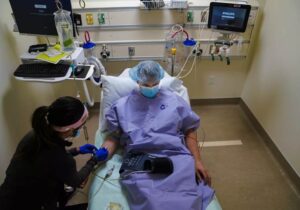During interviews with physicians, I often hear concerns with patients’ use of the Internet for healthcare information. Some physicians dismissively refer to this practice as ‘Dr. Google.’ These concerns are legitimate.
The Internet is a vast repository of data, facts, and information. And as in any public forum, there is excellence and there are snake oil salesmen.
Why Physicians Have Concerns with the Internet
Physicians may dislike patients’ use of the Internet for healthcare information for a number of reasons, including:
Inability to Discriminate – The quality of the information and the legitimacy of sources on the Internet varies widely. It’s all there — the good, the not so good, and the really horrible. The responsibility to filter for quality information is with the end user. Physicians question whether patients have the skills to identify legitimate, quality information from more questionable or dubious data.
Unfiltered – The sheer volume of information on the Internet can be staggering. There are no filters. Being overwhelmed or distracted by information that is not relevant, timely, or of value is understandable.
Differently Educated – Physicians bring years of training as well as experience to the practice of medicine. People without this expertise may not have the ability to properly evaluate the quality of information found on the Internet.
Self-Diagnosis – Physicians are most concerned with patients’ use of the Internet for self-diagnosis. This practice is problematic. Different diagnoses may express similar symptoms and any delays in treatment can lead to further complications. Additionally, the use of home treatments or remedies could cause even more issues.
Mystery Sources – Healthcare information pulled from the Internet may come from many different sources, all with varying degrees of quality. It is unrealistic to expect physicians to respond fully and knowledgeably to such diverse information during a patient appointment.
Why Patients Use the Internet …. for Clarification
Equally important is to understand why people search the Internet for healthcare information. Such searches are often legitimate and, in some cases, may improve patient care, lower medical costs, and save lives.
Checking Symptoms – People use the Internet to check out symptoms they may be having and to assess whether it is appropriate to make an appointment with a physician. Visits to physicians are costly in terms of both time and money, so for most people, this option is used sparingly.
Physicians may worry that information searches on symptoms sends people to the doctor’s office more often than necessary. There may also be concerns with driving up overall healthcare costs due to overutilization. In the end, however, if there is a serious problem, early detection may in fact reduce overall healthcare costs.
Identification of Questions – Searches on the Internet can help to identify questions to ask a physician during an upcoming visit. Bringing a list of questions to appointments is a step toward improving commmunication between physicians and patients. Furthermore, having answers to these questions empowers the patient through increased understanding of the issues.
… for Insights
Understanding a Diagnosis – A diagnosis often sends a patient’s head spinning. In these moments, patients don’t hear all of the information a physician is sharing. The patient may ask some questions but forget to ask others or, think of additional questions only after walking out the door. Physicians may also send patients home with information to read.
Despite all of this information sharing, it is not unusual for the patient to go to the Internet. Patients are searching for clarification and additional information to get a better understanding of the diagnosis.
A very good friend of mine ended up in the hospital due to a heart attack. During his stay, healthcare professionals shared information on the procedure as well as the stent used for his angioplasty. And certainly, the physicians and nurses were very responsive to questions.
Once he was discharged, however, there were many more questions about what happened and what to expect going forward. It’s simply not possible to bring the healthcare team home from the hospital. For him and his wife, the Internet was a critical educational and troubleshooting tool. In his situation, the information gained helped his recovery as well as providing insights on how to achieve and maintain a healthy lifestyle.
… for Support
Patient/Support Groups – Once there is a diagnosis, the Internet is a great resource to find other patients with a similar diagnosis. Patient groups can provide a tremendous source of support and contribute to patients feeling less alone through shared experiences.
Advocacy and support groups are easily found on the Internet. Advocacy organizations are a wealth of information with key resources that can assist and support a patient.
The Internet is a resource for finding your tribe; those people who understand what it is like to have your diagnosis. Such groups provide perspective, information, and reassurance during critical parts in the patient journey.
One of Many Sources
As a source for healthcare information, the Internet is a tool, use with care. Rather than resist, perhaps there is an opportunity to acknowledge both the strengths and weaknesses of this potent resource. Information gleaned from the Internet provides a way to start conversations and listen to the questions and concerns of the patient. And patients should feel confident using the Internet for education, support, and troubleshooting.
Internet Links
There are many, but here are a few trustworthy sources for medical information on-line:
- Mayo Clinic – a nonprofit academic medical center focused on integrated clinical practice, education, and research. https://www.mayoclinic.org/
- Columbia University Irving Medical Center – a large academic medical center comprised of many centers of excellence in New York City. http://newsroom.cumc.columbia.edu/
- American Cancer Society — a nationwide voluntary health organization focused on cancer research, education, prevention and support. https://www.cancer.org/
- PubMed – a search engine accessing primarily the MEDLINE database of references and abstracts on life sciences and biomedical topics. https://www.ncbi.nlm.nih.gov/pubmed/



